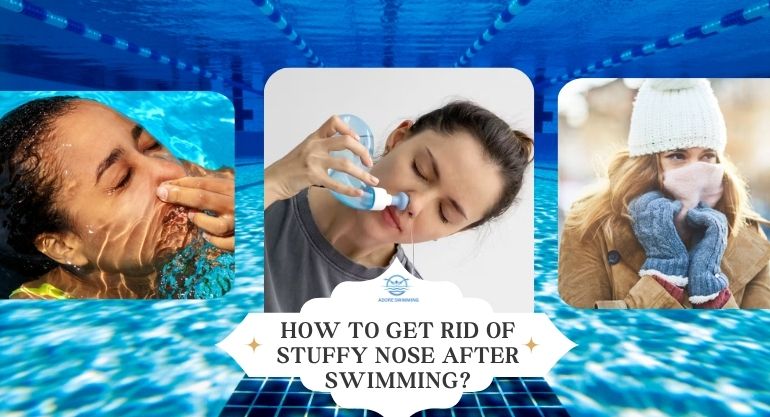How to Get Rid of Stuffy Nose After Swimming? (Easy Tips & Remedies)
If you’re wondering how to get rid of stuffy nose after swimming, the best ways include:
- After swimming, cover your nose and mouth with your hand so the cold air doesn’t hit them directly.
- Rinse your nose and mouth with a saline solution right after swimming to stay clean and avoid irritation.
- During the cold season, always wear a hat and a scarf to keep your nose and forehead warm.
- Take vitamin C regularly to stay healthy and prevent getting sick after swimming.
- After swimming, dry your hair with a hair dryer and gently blow some warm air toward your nose to keep it warm and clear.
A stuffy nose after swimming is very common, especially in chlorinated pools or cold water. It occurs when water or pool chemicals irritate your nasal passages, resulting in mucus buildup and congestion.
Knowing how to get rid of stuffy nose after swimming can make you breathe freely and do your exercises perfectly without any harm.
Why Your Nose Gets Stuffy After Swimming
Common reasons include:
- The chlorine in pools can sometimes irritate your nose and make it feel stuffy or dry.
- Saltwater can dry out the nasal passages, especially after swimming for a long time.
- Water might get trapped in your sinuses, causing pressure or a blocked feeling.
- Allergies or cold weather can make congestion worse after swimming.
- Breathing the wrong way underwater can also lead to water getting into your nose or sinuses. Learning how to breathe while swimming for beginners properly can reduce water entering your nose and help prevent congestion.
A study of 180 swimmers (30 competitive, 150 recreational) published in Acta Otorhinolaryngologica Italica found that 18% of swimmers experienced nasal or sinus symptoms after swimming. Overall, swimming did not affect lung function or nasal resistance.
Remedies & Methods: How to Get Rid of Stuffy Nose After Swimming?
| Remedy | How to Do It | Why It Helps |
|---|---|---|
| Cover nose and mouth after swimming | Use your hand to shield your nose and mouth from cold air when leaving the pool | Prevents sudden cold air from irritating your nasal passages |
| Rinse with saline solution | Flush your nose and mouth with a saline spray right after swimming | Clears chlorine, salt, or other irritants and prevents congestion |
| Wear a hat and scarf in cold weather | Keep your nose and forehead covered after swimming | Keeps your nasal passages warm and reduces the chance of stuffiness |
| Take vitamin C regularly | Include vitamin C in your diet daily | Supports your immune system and helps prevent colds or sinus irritation |
| Use a hair dryer on a warm setting | Dry your hair and gently blow warm air toward your nose | Helps keep your nose warm and clear of any trapped water or irritation |
Sneezing and Runny Nose After Swimming in the Ocean
Swimming in the ocean can sometimes make your nose sneeze or run because of the salt and minerals in the water.
To avoid this, many swimmers rinse their noses with fresh water or a saline solution right after getting out.
Some even put a little petroleum jelly around their nostrils to protect against the salty water.
Nasal Congestion After Swimming in a Lake
Lakes can have pollen, algae, or tiny particles that make your nose feel blocked. If this happens, rinsing your nose with saline right after swimming usually helps. saline spray clears it fast.
Runny Nose After Swimming in Salt Water
Saltwater can have mixed effects on your nose. Some swimmers find it helps clear mucus, while others feel it dries out their nasal passages.
A quick nasal rinse with distilled water after swimming usually restores balance and prevents your nose from feeling irritated or raw.
Step-by-Step Plan to Prevent Stuffy Nose After Swimming
- Before swimming, apply saline or wear a nose clip.
- After swimming, rinse your nose with a saline spray.
- Take a warm shower to inhale steam.
- Stay hydrated throughout the day.
- If symptoms continue, talk to a doctor; you may have swimmer’s sinusitis.
FAQs:
How long does a stuffy nose last after swimming?
Usually, a few hours. It can last longer if water or chlorine stays in your nose. Rinsing with saline and staying warm helps clear it faster.
How to get rid of a blocked nose after swimming?
Rinse your nose with saline, blow gently, take a warm shower, or inhale steam, and keep your nose warm. Using a nose clip while swimming can prevent it next time.
Why do I sound congested after swimming?
Your nose can get blocked from water or chlorine, which makes your voice sound stuffy for a short time.
Can chlorine cause congestion after swimming?
Yes. Chlorine can irritate your nose and make it feel blocked. Rinsing with saline and using a nose clip helps a lot.
Why do I feel like I have a cold after swimming?
It’s often just irritation from water, chlorine, or cold air — not an actual cold. Knowing how to get rid of stuffy nose after swimming can help prevent discomfort.



Leave A Comment